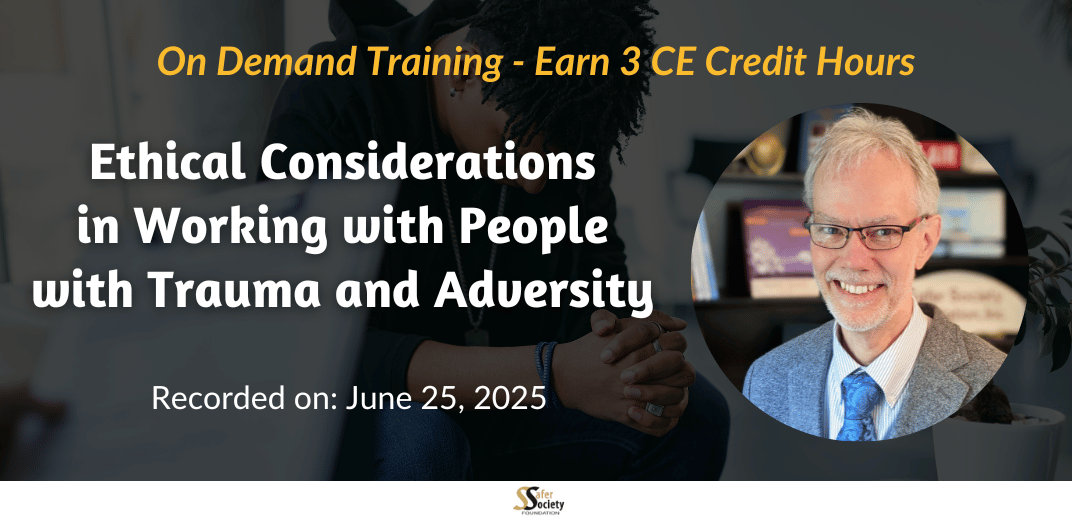
Ethical Considerations in Working with People with Trauma and Adversity
Already purchased an On Demand training?
Click here to access your Safer Society On-Demand Training Center account.
A surge in research in the past two decades has revealed that the effects of early life adversity and other forms of trauma across all age groups, including those involved in the criminal justice system, is a complex landscape in need of better understanding by treatment providers. A growing body of evidence highlights a potential disconnect between therapists’ intentions to provide trauma-informed care and clients’ experiences in treatment. Concepts such as “post-conviction traumatic stress,” introduced by Danielle Harris and Jill Levenson, underscores the challenges faced by both practitioners and clients.

This training begins by examining this evidence and its implications for effective treatment. Presenter David Prescott then delves into the common ethical challenges encountered when treating individuals who have experienced and those who perpetrated harm. Mr. Prescott provides a framework for resolving such dilemmas, with a particular emphasis on the critical role of maintaining professional boundaries and upholding ethical standards in clinical practice.
Ultimately, this training aims to enhance participants’ capacity to navigate the ethical considerations inherent in treating individuals impacted by early adversity.
1) Explain the connection between past adverse experiences and re-offense risk.
2) Integrate strategies into treatment to ensure ethical practice and enhance client engagement.
3) Identify and describe common ethical dilemmas in working with individuals who have both harmed others and experienced harm themselves.
4) Summarize ethical dilemmas that commonly arise in professional practice, particularly with clients who have abused others and who have been abused.
5) Apply well-established protocols for resolving ethical dilemmas.
Audience
This training is primarily for professionals who work with individuals who have histories of trauma and adversity, with a particular focus on individuals who have engaged in harmful behaviors and those who have been harmed. This includes social workers, psychologists, mental health clinicians and counselors, case managers, and probation or parole officers.
Content Level
Disclosure
Continuing Education Approval
American Psychological Association (APA)
Safer Society Foundation, Inc. is approved by the American Psychological Association (APA) to sponsor continuing education for psychologists. Safer Society Foundation, Inc. maintains responsibility for this program and its content.
Who's Presenting

David Prescott, LICSW, ATSA-F
A mental health practitioner of 40 years, David Prescott is the Director of the Safer Society Continuing Education Center. He is the author and editor of 25 books in the areas of understanding and improving services to at-risk clients. He is best known for his work in the areas of understanding, assessing, and treating sexual violence and trauma. Mr. Prescott is the recipient of the 2014 Distinguished Contribution award from the Association for the Treatment and Prevention of Sexual Abuse (ATSA), the 2018 recipient of the National Adolescent Perpetration Network’s C. Henry Kempe Lifetime Achievement award, and the 2022 recipient of the Fay Honey Knopp Award from the New York State Alliance for the Prevention of Sexual Abuse and New York State ATSA. He also served as ATSA President in 2008-09. Mr. Prescott currently trains and lectures around the world. His published work has been translated into Japanese, Korean, German, French, Polish, and Southern Tutchone. He has served on the editorial boards of four scholarly journals.
